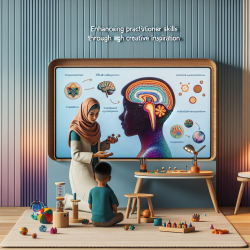Introduction
Recent research has highlighted the significant role of genetic variations in the GABRA4 gene in contributing to neurological phenotypes, including developmental delays, behavioral abnormalities, and epilepsy. This discovery opens up new avenues for speech-language pathologists and other practitioners to enhance their practice and improve outcomes for children with these challenges.
Understanding GABRA4 and Its Impact
The GABRA4 gene encodes a subunit of the GABAA receptor, which plays a crucial role in inhibitory neurotransmission in the brain. Variants in this gene have been associated with a spectrum of neurodevelopmental disorders. This research identified three novel de novo missense variants in GABRA4, reinforcing its association with neurological conditions.
Clinical Implications for Practitioners
For practitioners, understanding the genetic underpinnings of these conditions can lead to more targeted interventions. Here are some ways practitioners can apply these findings:
- Personalized Therapy Plans: By recognizing the genetic factors contributing to a child's condition, practitioners can tailor therapy plans that address specific needs, potentially improving efficacy.
- Collaboration with Geneticists: Engaging with geneticists can provide a more comprehensive understanding of a child's condition, allowing for more informed therapy decisions.
- Monitoring and Assessment: Regular assessments can help track the progress of interventions and adjust them as necessary, ensuring they remain effective as the child develops.
Encouraging Further Research
While this study provides valuable insights, it also highlights the need for further research. Practitioners are encouraged to stay informed about ongoing research and consider participating in studies that can contribute to a deeper understanding of these genetic influences.
Conclusion
By integrating genetic insights into practice, speech-language pathologists and other practitioners can enhance their ability to support children with neurodevelopmental disorders. This approach not only improves individual outcomes but also contributes to the broader understanding of these complex conditions.
To read the original research paper, please follow this link: De novo variants in GABRA4 are associated with a neurological phenotype including developmental delay, behavioral abnormalities and epilepsy.










